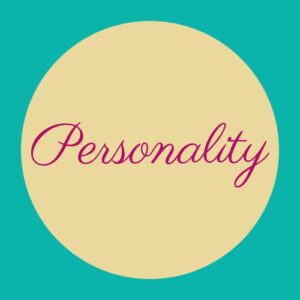So what’s personality anyway? It’s those consistent behaviors and characteristics that makes you, well, you; and me, me. And everyone else them. How your character develops depends on a lot of things.
What you were taught growing up? When it comes to norms and values, how do your family’s, your social circle’s, and your culture’s norms and values differ? What past or current personal experiences affect you? Nature versus nurture plays a role too – biology and genetics may have formed parts of you.

For millennia people have been thinking about what influences our personality. Ancient Greeks like the physician Hippocrates and the philosopher Plato theorized about personality, and what we now consider mental health. In Eastern philosophies and religions, such as Buddhism, theories have been around for millennia too. Once our basic needs were met and our basic safety guaranteed it seems humanity was ready to study what it means to be human.
Early 20th Century students of personality
I’m pretty sure you’ve heard these names: Freud, Jung, and Myers-Briggs. They are all well known experts on personality.
Freud theorized that the mind was made up of 3 parts: the id (our primal selves), ego (our realistic selves, that mediate between id and superego) and superego (our critical and moral selves). Personality to Freud was how we dealt with the conflicts between these three selves, as well as how we coped with anxiety (coping mechanisms) and how we maintain a positive self-image (defense mechanisms).
Jung proposed that personality was based on how we gather and process information. He proposed that everyone had preferences in various areas.
Do you count on your senses or your intuition?
Do you think or feel first?
Based on these preferences plus whether you look within to process information or seek guidance from external sources, Jung theorized there were 8 personality types.
Myers-Briggs
Myers-Briggs took Jung’s 3 preferences, and added a fourth category: how we decide to deal with with the outside world. These 4 preferences in how we perceive the world (do we think or feel? do we sense or intuit?) and how we make decisions (do we judge or perceive) she tried to make more accessible by creating the Myers–Briggs Type Indicator (MBTI). This is a questionnaire that required the participant to self-report.
Weakness of personality tests based on MBTI
Although personality tests based on MBTI are used often in a lot of different areas of life, there is one, big, gaping issue with it. It counts on accurate self-reporting by the participant.
Do you know yourself, your coping mechanisms, defense mechanisms, id, ego and superego well enough to be able to honestly answer the questions asked? Yep, we’re circling back to Freud.
You know those people I’m sure. They can get their panties twisted in a bunch over something someone did to them. But if you point out that they do the same things themselves they throw a tantrum and cannot see the flaw in themselves.
Or they simply just deny it ever happened. In some cases they’ve literally wiped the whole situation from their memories.
In the end it’s quite simple – in order to protect our positive self image, our egos have found ways to deal with inconsistencies in our own personalities. We might have been taught certain values and norms by our environment, but our primal selves may not actually agree with those norms and values. Can you allow both those opposite ideas and feelings to exist side by-side? Are you aware of them? Or has your ego developed some way to suppress either one in order to protect yourself?
Before You take an MBTI personality test – Know Yourself
“Self-knowledge is like lost innocence; however unsettling you find it, it can never be ‘unthought’ or ‘unknown’.” ― Michael J. Sandel, Justice: What’s the Right Thing to Do?
Even if you have no interest in Law, I recommend following this free Harvard course via edX. It will probably teach you a lot about yourself and your core values and beliefs. Fair warning: you might not like some of what you find out. You might be confronted with that which you’ve been taught or believe about yourself and how you view the world, might be different if you’re confronted with situations in which your own self is in danger.
In the end you know yourself best. If you take personality tests when you’re not aware of your own mechanisms, the test will most likely just underwrite your ‘positive self-image’.
If you are self aware and willing to answer honestly, taking these tests will help explain aspects of yourself. Things like enneagram tests may lead to even greater self-awareness.
Pro Tip: do the test in the language you know yourself best in. Your first language, not necessarily your mother tongue.
Want to know more about your personality, but can’t be bothered with too much technical psychology mumbo-jumbo? Have a look at https://www.psychologyjunkie.com/.

